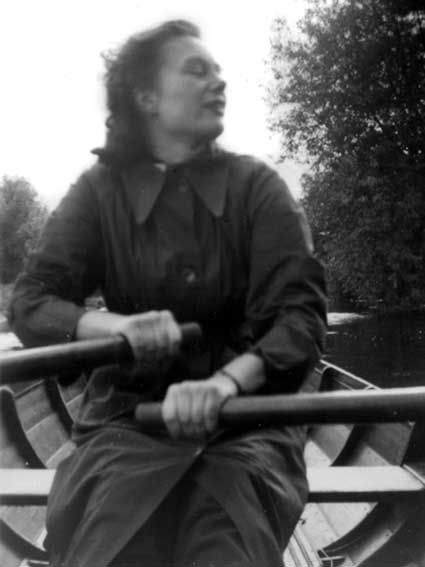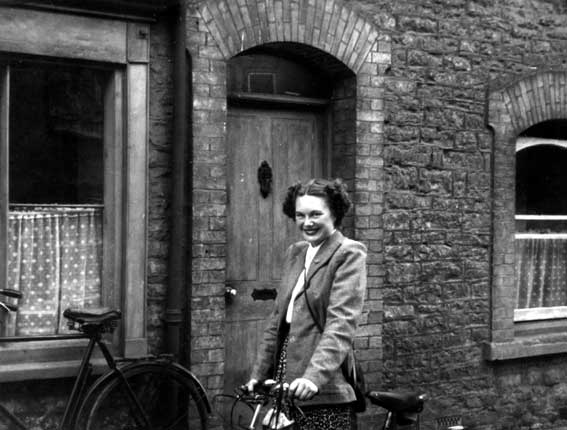Part 2: My Early Years in the Dorset of William Barnes
Hilary Townsend

I grew up in Stalbridge and, like William Barnes, swam in the `cloty` (yellow waterlillied) sullen River Stour at Cutt Mill, near Hinton St. Mary. I expect I looked a bit like him too `wi arms a-spreaden and cheeks a-blowen`.
In Barnes's youth there was the threat of Napoleon massing his troops at Boulogne to invade this country. In mine, Hitler laid the same plans.
In the bleak years after Waterloo many small farmers were ruined and had to leave their farms. Barnes' beloved `Uncle and Aunt` Charles Rabbetts and his wife were victims and had to leave `Pentridge by the River`. In the 1930's the Agricultural Depression caused my father the loss of his farm.
Barnes, deeply aware of the plight of the labouring classes of his day, conveyed their misery to other social classes by the clever use of dialogue in the Eclogues. Here two men discuss their difficulties in the broadest, purest Dorset dialect for Barnes knew that to embrace radicalism outright would have ruined him.

However, there are happy coincidences in our two lives. In one of the Barnes poems I love most he conveys simple images of a comely girl riding side saddle, (`her skirt's a-spreaden wide). She rides through all time and seasons through his beloved Blackmore Vale. It is `Ruth a-Riden`. I had no horse but I had a bicycle and, wearing trousers fastened with tin trouser clips, I cycled in all weathers and times of day. I rode by `banks wi' primrwose-beds bespread and stately elems overhead`. I was so lucky. We had stately elems (elms) still in those days.
Ruth A-Ridèn
by William Barnes
Ov all the roads that ever bridge
Did bear athirt a river’s feäce,
Or ho’ses up an’ down the ridge
Did wear to doust at ev’ry peäce,
I’ll teäke the Stalton leäne to tread,
By banks wi’ primrwose-beds bespread,
An’ steätely elems over head,
Where Ruth do come a-ridèn.
An’ I would rise when vields be grey
Wi’ mornèn dew, avore ’tis dry,
An’ beät the doust droughout the day
To bluest hills ov all the sky;
If there, avore the dusk o’ night,
The evenèn zun, a-sheenèn bright,
Would pay my leäbors wi’ the zight
O’ Ruth — o’ Ruth a-ridèn.
Her healthy feäce is rwosy feäir,
She’s comely in her gaït an’ lim’,
An’ sweet’s the smile her feäce do wear,
Below her cap’s well-rounded brim;
An’ while her skirt’s a-spreädèn wide,
In vwolds upon the ho’se’s zide,
He’ll toss his head, an’ snort wi’ pride,
To trot wi’ Ruth a-ridèn.
An’ as her ho’se’s rottlèn peäce
Do slacken till his veet do beät
A slower trot, an’ till her feäce
Do bloom avore the tollman’s geäte;
Oh! he’d be glad to oben wide
His high-back’d geäte, an’ stand azide,
A-givèn up his toll wi’ pride,
Vor zight o’ Ruth a-ridèn.
An’ oh! that Ruth could be my bride,
An’ I had ho’ses at my will,
That I mid teäke her by my zide,
A-ridèn over dell an’ hill;
I’d zet wi’ pride her litty tooe
’Ithin a stirrup, sheenèn new,
An’ leäve all other jaÿs to goo
Along wi’ Ruth a-ridèn.
If maïdens that be weäk an’ peäle
A-mwopèn in the house’s sheäde,
Would wish to be so blithe and heäle
As you did zee young Ruth a-meäde;
Then, though the zummer zun mid glow,
Or though the Winter win’ mid blow,
They’d leäp upon the saddle’s bow,
An’ goo, lik’ Ruth, a-ridèn.
While evenèn light do sof’ly gild
The moss upon the elem’s bark,
Avore the zingèn bird’s a-still’d,
Or woods be dim, or day is dark,
Wi’ quiv’rèn grass avore his breast,
In cowslip beds, do lie at rest,
The ho’se that now do goo the best
Wi’ rwosy Ruth a-ridèn.

Starts 12:30
From the Stacks: Highlights from the William Barnes Archive

Starts 09:00
ONLINE | Barnes Night: A Celebration of the Life and Work of William Barnes

15:00 till 17:00
Tea with William Barnes

14:00 till 17:00
Hardy and Dorset Dialect

Starts 09:00
ONLINE | A Dorset Spring through the Poetry of William Barnes

